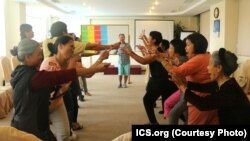Gay Vietnamese are coming out at an early age and doing so in a more welcoming environment, according to a new survey.
Of those who participated in the online study, 78 percent had come out already, and 74 percent recognized their sexual identity between ages 10 and 20. The results are not an accurate sample of Vietnam overall, because the average age of respondents was 22.
But ICS, an advocacy group for lesbian, gay, bisexual, and transgender (LGBT) people, which released the data Jan. 27 said it was promising that 56 percent of people in the survey needed less than a year to accept their sexuality.
“It was an interesting surprise because in my time, it took years,” ICS director Tran Khac Tung said at the study’s unveiling. “But the youngsters take less than a year.”
LGBT Vietnamese seem to spend less time struggling with their sexuality because, advocates say, Vietnam has become a more tolerant place. When asked about how the country has changed since 1998, four out of five survey participants said they saw positive developments.
The three biggest areas of progress were that LGBT people felt more confident to be themselves, the government is starting to recognize them, and there are more activities available for their community.
Person-to-person contact
What’s more, three-fourths of Vietnamese use Facebook to stay in touch with other LGBT people, but physical meetings are on the rise. The study said 45 percent of people interact with other LGBT Vietnamese through school or work, 32 percent through community events, and 27 percent through friends.
“More and more people are connected with each other through person-to-person [contact], rather than online,” Tung said. “That is a very good sign, because we are coming out more.”
Family pressures
But challenges remain, especially at home. While Vietnam is liberalizing socially, the key difficulty LGBT people face is gaining acceptance from their parents. Among respondents, pressure from family ranked as the top difficulty in self-identity (52 percent), as opposed to pressure from friends or work. Of those who hadn’t come out, 22 percent said they were afraid of family rejection.
Many turn to their friends to come out and seek support, rather than their parents. When Vietnamese learn that their children are gay or another sexual minority, it's common for them to impose counseling or other treatment, disown the children, force them to wear different clothes, or threaten their partners.
“These painful situations still exist in Vietnam,” said Tieu Thi Ai Nhi, a member of the Vietnam chapter of PFLAG, a group for parents and friends of LGBT people.
Global momentum
Besides PFLAG, other international voices have added to the momentum around Vietnam’s burgeoning LGBT rights movement. Those range from Germany’s Rosa Luxemburg Foundation, which provides funding for related events, to the new U.S. ambassador, Ted Osius. Before arriving in Hanoi with his husband and adopted son, Osius said in an interview that the image of his diverse family could be encouraging to gay Vietnamese.
“The possibility exists that we can help in a country of 92 million people move the ball forward, potentially.... I would like to think we might have some marginal influence,” he said.
Canada, too, has joined the cause, with a top diplomat saying the rights of all, whether gay, straight, or otherwise, are a priority.
“This is not a matter of choosing which rights we wish to defend, or whose rights we wish to protect,” Wayne Robson, the Canadian consul general in Ho Chi Minh City, said in a speech during the announcement of the ICS survey.




